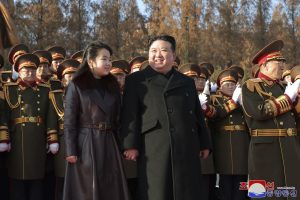On the first day of this year, Japan was shaken by a major earthquake that struck the Noto Peninsula in Ishikawa Prefecture. Among the messages of sympathy that poured in from around the world, one that surprised many observers came from North Korean leader Kim Jong Un, in the form of a telegram to Japanese Prime Minister Kishida Fumio. It is not clear whether Kim was approaching Japan as a way to drive a wedge between the three countries of Japan, the United States, and South Korea, or simply to show that he is a humanitarian. However, since this is the first time that Kim Jong Un has sent a direct message to a Japanese leader, we may assume that there was some political intent behind it.
The outreach notwithstanding, North Korea will still be pushing forward with weapons development this year. At the Plenary Meeting of the Central Committee of the Workers’ Party of Korea at the end of 2023 and the Supreme People’s Assembly in January this year, Kim said that the current situation is “on the brink of nuclear war,” crudely blaming this on the United States and its “followers.”
In particular, with regard to inter-Korean relations, Kim has suggested that it is no longer possible to unify the two countries, contrary to the South Korean administration’s advocacy of “absorption and unification,” and announced decisions to abolish three institutions that have served as liaisons to the South for many years as well as to prohibit the use of “residual words” such as “unification” and “80 million Koreans.” Demonstrating once again his strong tendency to press ahead once he makes a decision, Kim has also ordered that South Korea be clearly identified in the constitution as an “unchangeable main enemy.”
This is the biggest turning point since his grandfather Kim Il Sung called for the “Federal Democratic Republic of Goryeo” in 1980. However, since unification under North Korean leadership is not realistic, you could argue that Kim Jong Un is simply confirming the status quo with strong language. With the abolition of organizations such as the Committee for the Peaceful Reunification of the Fatherland, we may not expect any inter-Korean dialogue for the time being, so statements condemning the South will be issued by other organizations such as the Ministry of Foreign Affairs.
One of the lessons Kim learned from the 2018-2019 dialogue offensive was that no matter what advances are made in inter-Korean relations, no real benefit will accrue unless results are achieved in North Korea’s relationship with the United States. If Trump is re-elected this year and shows a willingness to compromise with Pyongyang, there is a possibility of U.S.-North Korea negotiations resuming, but all such measures would certainly go over South Korea’s head.
At the same time, Kim Jong Un has issued instructions for relations to be developed with other socialist states as well as “anti-imperialist states opposing the ‘hegemony strategy’ of the United States and other Western nations.” However, only five socialist countries remain, including North Korea, and so only a limited number of countries can band together for an anti-imperialist cause. Along with the strengthening of relations with Russia that proceeded with such pace last year, many eyes have been focused on trends in China-North Korea relations. As far as the tone of the North Korean media is concerned, the friendship with Beijing is stable, while trade has returned to pre-pandemic levels after being restricted to prevent the spread of COVID-19. With the restoration of inter-personal exchanges between China and North Korea, the real question is if Beijing can put the brakes on Pyongyang’s hard line.
An excessive emphasis on a military buildup will impose new sacrifices on North Korean living standards. Kim Jong Un has acknowledged that “the reality is that even the simple needs of the people cannot be satisfied,” urging for improvements with regard to the food problem. Of particular note is his clarification of the policy for correcting the disparities between the capital Pyongyang and the provinces. Successive North Korean leaders have invested intensively in the capital to the extent that it is often ridiculed by foreigners as a “show window.” Kim’s own inspection visits are also biased toward Pyongyang, but for some reason, he has now begun to raise the issue of regional disparities, pointing out that “we absolutely cannot ignore them.”
A new proposal has been put forward in the “Local development 20×10 policy,” which will promote the construction of local industry factories in 20 counties over 10 years. The name is quite catchy, not always the case in North Korea. The contents of Kim Jong Un’s remarks indicate that he is quite serious about this plan, but there is naturally a limit to such grand plans in the absence of any prospect of the severe economic sanctions being lifted. Still, it’s a worthwhile policy for Kim to look now to regional economies, after so many years of neglect.
For Kim Jong Un, whose number one aim is to perpetuate the regime, what matters most may be his “beloved daughter.” Her growing presence in North Korea cannot be overlooked. Since her first appearance in North Korean media in November 2022, she has accompanied her father on numerous occasions, especially in the military sphere, including observations of missile tests.
Since the start of this year, the North Korean media have introduced Kim’s daughter with the phrase “accompanied by his beloved daughter.” Not only is honorific language always used, but her actions are introduced before those of other high-ranking officials such as the Politburo Standing Committee and Kim Yo Jong. It seems likely that the reason for Kim Jong Un’s efforts to protect the country by strengthening its military power and to win greater popularity by developing regional economies is out of concern for his daughter’s future.

































